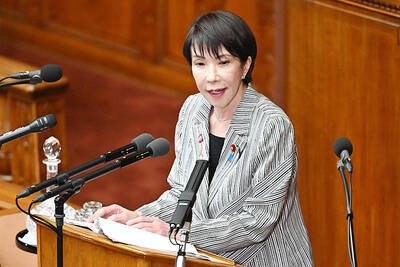The Ministry of Economic Affairs and Panamanian trade officials said yesterday that the two nations have concluded negotiations on signing a Free Trade Agreement (FTA) after a fifth round of talks.
The agreement will be the first FTA to be concluded by Taiwan.
The agreement will be officially signed on Aug. 21 by President Chen Shui-bian (陳水扁) and Panamanian President Mireya Moscoso, during the latter's trip to Taipei. It will take effect on Jan. 1 next year.
"It's a milestone for both countries," Minister of Economic Affairs Lin Yi-fu (林義夫) told reporters yesterday.
"I expect the signing of the pact will raise the relationship between the two nations to a higher level." Lin said.
Lin's counterpart, Panama's Minister for International Trade Joaquin Jacome, was also delighted by the conclusion of what is his country's second FTA.
"The treaty will not only strengthen the two countries' diplomatic ties, but also help Panama's economy by providing a gateway for Panamanian goods to the rest of Asia," Jacome said.
Under the treaty, both countries agree to open their markets in agricultural and industrial commodities and the service and financial sectors
The immediate impact of the agreement on the economies of both sides will be in customs revenue.
When the agreement goes into effect, 6,200 categories, or 71 percent of Taiwanese products exported to Panama will become duty free, while the same tariff-free measure will also applied on 4,160 categories, or 48.49 percent of Panamanian goods exported to Taiwan.
Overall, 97 percent of exports from Taiwan to Panama will be duty free, while taxes on 95 percent of Panamanian goods in Taiwan will also be cut to zero by 2014.
Academics praised the conclusion of the FTA, saying that Taiwan will gain more from the agreement owing to the larger quantity and variety of goods it exports.
"Exports from Panama will not be significantly grow because of the duty-free measure since Panama only exports 24 categories of products to Taiwan," said Wu Rong-i (吳榮義), president of the Taiwan Institute of Economic Research. "Also, they have to compete with goods from China, Hong Kong and South Korea."
Currently, Panama ranks 70th among Taiwan's trading partners, with over US$42 million in bilateral trade for the year to May. Last year, imports of Taiwanese goods in Panama amounted to US$123 million, and Panamanian exports to Taiwan US$4.8 million.
Taiwan, however, can also use Panama as a channel to exploit and integrate the massive South American market, Wu said. The economic benefits will multiply after Panama is included in the Free-Trade Agreement of the Americas, which is the biggest inter-regional trade zone in the world, Wu said.
Another academic said, however, that the political benefits brought by the trade pact will be much larger than any economic ones.
"The move will enhance a willingness among other countries to sign FTAs with Taiwan; many were reluctant to be Taiwan's first free trade partner out of political considerations," said Daniel Liu (

The Central Weather Administration (CWA) yesterday said it expected to issue a sea warning for Typhoon Fung-Wong tomorrow, which it said would possibly make landfall near central Taiwan. As of 2am yesterday, Fung-Wong was about 1,760km southeast of Oluanpi (鵝鑾鼻), Taiwan’s southernmost point, moving west-northwest at 26kph. It is forecast to reach Luzon in the northern Philippines by tomorrow, the CWA said. After entering the South China Sea, Typhoon Fung-Wong is likely to turn northward toward Taiwan, CWA forecaster Chang Chun-yao (張峻堯) said, adding that it would likely make landfall near central Taiwan. The CWA expects to issue a land

Taiwan’s exports soared to an all-time high of US$61.8 billion last month, surging 49.7 percent from a year earlier, as the global frenzy for artificial intelligence (AI) applications and new consumer electronics powered shipments of high-tech goods, the Ministry of Finance said yesterday. It was the first time exports had exceeded the US$60 billion mark, fueled by the global boom in AI development that has significantly boosted Taiwanese companies across the international supply chain, Department of Statistics Director-General Beatrice Tsai (蔡美娜) told a media briefing. “There is a consensus among major AI players that the upcycle is still in its early stage,”

‘SECRETS’: While saying China would not attack during his presidency, Donald Trump declined to say how Washington would respond if Beijing were to take military action US President Donald Trump said that China would not take military action against Taiwan while he is president, as the Chinese leaders “know the consequences.” Trump made the statement during an interview on CBS’ 60 Minutes program that aired on Sunday, a few days after his meeting with Chinese President Xi Jinping (習近平) in South Korea. “He [Xi] has openly said, and his people have openly said at meetings, ‘we would never do anything while President Trump is president,’ because they know the consequences,” Trump said in the interview. However, he repeatedly declined to say exactly how Washington would respond in

Japanese Prime Minister Sanae Takaichi said yesterday that China using armed force against Taiwan could constitute a "survival-threatening situation" for Japan, allowing the country to mobilize the Japanese armed forces under its security laws. Takaichi made the remarks during a parliamentary session yesterday while responding to a question about whether a "Taiwan contingency" involving a Chinese naval blockade would qualify as a "survival-threatening situation" for Japan, according to a report by Japan’s Asahi Shimbun. "If warships are used and other armed actions are involved, I believe this could constitute a survival- threatening